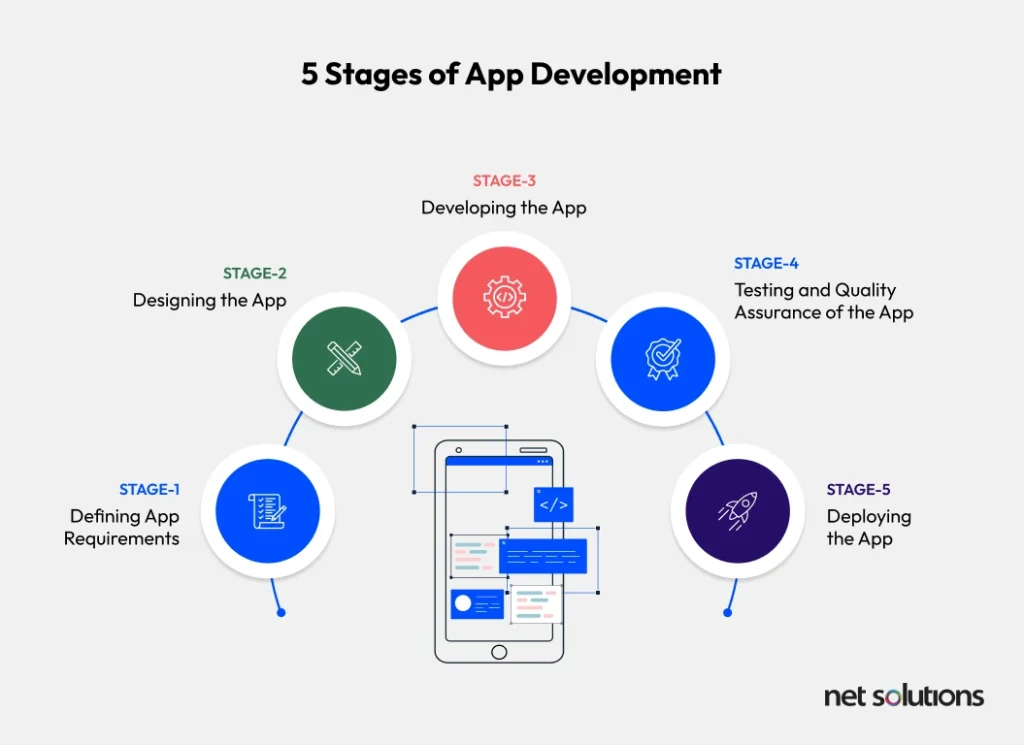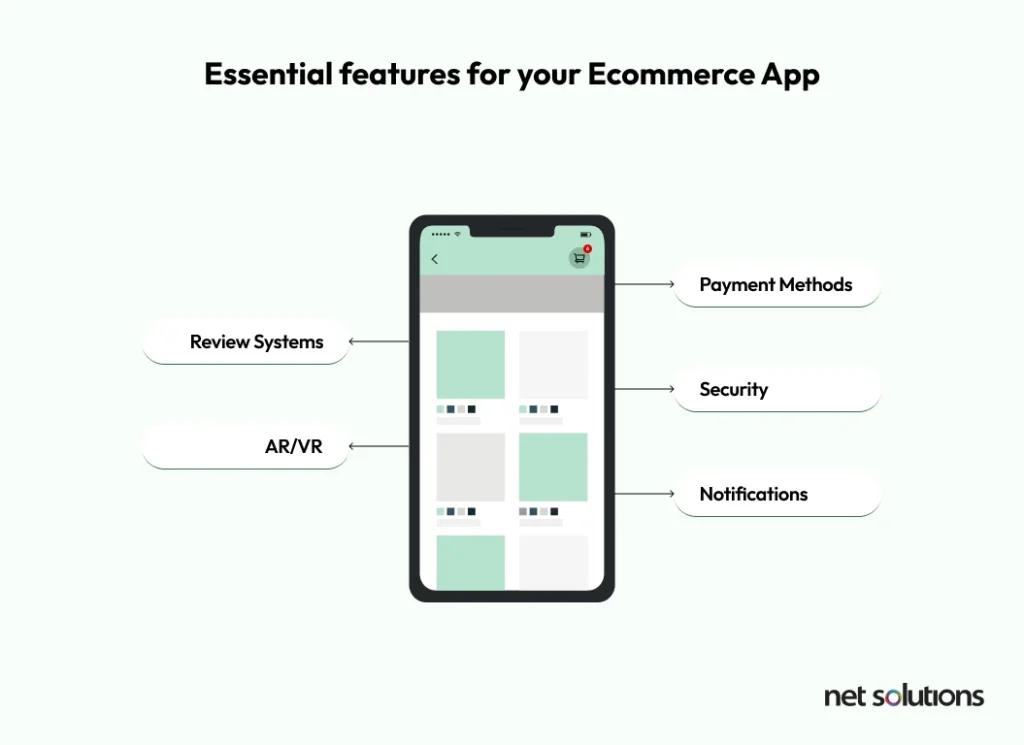AI and automation, shifting employee expectations, new skill economies, and hybrid work: all of these have shaped the work and workforce of today. To remain competitive and to attract and retain a skilled workforce, organizations are continuing to digitally transform business operations to become more agile, cost-efficient, and responsive to shifting employee needs.
While enterprise platforms and software have had their place, many organizations are increasingly frustrated with vendor solutions that are not evolving to meet pace with their requirements—or that are happy to give you the latest tools and capabilities, for a price. Rather than get locked into vendor solutions, many organizations are re-evaluating the benefit of developing their own enterprise software and specifically mobile apps, which meet the needs of today’s highly mobile hybrid workforce.
In this guide, we will help you understand:
- How companies are using enterprise mobile apps
- Why mobile apps are a critical part of a digital enterprise (ROI)
- How to ensure your app is scalable, secure and future-proof
- How to get started
What Is Enterprise Mobile App Development?
An enterprise mobile application is a mobile application that is bought or created to support an organization and its employees. Most enterprise mobile apps are designed to support different areas of the organization:
- Employee-level apps support employee productivity and experience
- Department-level apps support specific business functions (e.g. finance) and collaboration
- Organization-level apps support decision making, collaboration, and monitoring and any shared-resource services (e.g. HR benefits)
While off-the-shelf platforms and apps can suit many requirements, enterprise mobile application development is the process of creating custom or bespoke mobile apps that are tailored to your specific needs, workflows and systems and to be exclusively used by your company employees and/or partners.
Enterprise mobile apps can serve many purposes within an organization or department, which we’ll explore next. However, it’s important to note that our definition of enterprise mobile apps does not include mobile apps created for use by your customers or buyers.
What Are the Different Types of Enterprise Mobile Applications?
According to Verified Market Research, enterprise applications can be categorized into the following segments: human capital management, accounting and finance, supply chain management, customer relationship management, m-learning, communication and collaboration, business management, business analytics, and productivity tools.

Productivity tools
Productivity tools are designed to support everyday activities such as schedules, tasks and projects. While there are various off-the-shelf productivity solutions, custom apps are in a better position to support your specific workflows, leverage a deeper integration with your systems, or foster efficiency or accountability through gamification. Productivity apps increasingly leverage automation and artificial intelligence (AI).
Human capital management
These tools can be used by HR professionals or by employees interacting with HR. Tools for HR professionals can assist across a wide variety of processes including employee recruitment, onboarding / offboarding, performance monitoring, insider risk management, records management, benefits administration, and payroll. For employees, HR tools can provide ready access to benefits and self-service tools for time tracking, PTO requests, address or banking changes, and feedback tools.
Communication and collaboration
While Slack, Teams, Asana, Trello and Zoom come to mind for communication and collaboration, custom apps can be designed to better integrate with internal systems and workflows. Custom solutions are particularly important in highly regulated industries.
Project management
Dissatisfied with how existing project management apps managed tasks or collaboration, this high tech client asked us to develop a custom mobile app, the result of which helped increase productivity and accelerate project deliveries.
Customer relationship management
Customer relationship management tools, or sometimes referred to more simply as marketing automation tools, support sales and marketing teams in their efforts. Examples include customer segmentation, lead tracking, sales funnel management, campaign management, automated billing (quoting/invoicing), customer support, customer satisfaction, and reporting. deliveries.
Accounting and finance
Streamline financial processes (e.g. invoicing, payments, budgeting) with deep integrations with systems of record (ERP, CRM) and third-party payment gateways. Include organization-specific requirements such as authorizations or build in custom forecasting models.
Business analytics
It is critical that businesses have intelligent analytics applications that track performance externally as well as internally across the organization, as well as at the department, employee and process level.
Business management applications
Outside of analytics, which facilitate decision making, are a series of apps that specifically organize major operations of the organization. These apps make it easier for staff to manage business processes on the go and to track metrics of critical operations, including:
- Inventory management
- Warehouse management
- Supply chain management
- Enterprise resource management
m-learning
While sometimes considered a subset of HR, learning & development applications can help upskill, reskill and coach employees and support employees through change. M-learning can help employees fit education into those in-between moments anytime, anywhere when learning can be more focused and effective.
Building Soaq’s flagship engagement platform
Like other organizations, Soaq saw how organizations were challenged with internal communications: employees simply didn’t open emails or engage with training materials. Soaq came to Net Solutions to build the solution: an intelligent, flexible platform designed to support engagement.
What Are The Benefits of Enterprise Mobile App Development?
There are many reasons that organizations may want to develop their own mobile apps instead of purchasing an off-the-shelf solution or subscription, in the case of software-as-a-service (SaaS).
Reduce vendor lock-in
When you are heavily reliant on a solution or platform, you may find yourself facing increasing contract costs and costly add-ons and risks that emerge if a product is discontinued or modified, which could impact your custom integrations or additions.
Eliminate patchwork solutions
Rather than leveraging several apps or tools to support your specific needs, you can reduce software bloat and unnecessary workarounds with a custom solution that becomes a single source of truth for your needs.
Advanced technology
Leverage the latest frameworks and technologies (e.g. AI) to develop solutions that enhance your specific operations and help align with your organization’s strategic transformation efforts.
Build the features you want
Custom and bespoke solutions may take longer to build than an off-the-shelf solution, but you have full control over which features you want (or don’t want) in your app and how you want your app to look.
Reduce cost
While ready-made apps can be inexpensive in the short-term, either with a fixed cost or subscription model, these costs can add up over time, particularly if the vendor charges extra for upgrades or added features or if custom work is required for integration or to add custom elements.
For budget conscious organizations, a variety of low code / no code tools are making mobile app development even more accessible.
Easier system integration
Rather than fighting a solution to fit your systems, you can build appropriate integrations into your app design.
Optimize business processes with automation
Leverage AI to automate workflows within and across systems, reduce process errors, and elevate employee capabilities with human-AI collaboration possibilities (e.g. GenAI assisted work, smart delegation and task management).
Translate efficiencies to increased revenue
Streamlining operations and supporting retention efforts has a direct impact on the bottom line.
Competitive differentiation
Creating apps that support your business goals can help set your organization apart, which could come in the form of delivering better customer service, making better informed decisions, or delivering products or services in a faster time.
Employee experience
Organizations that support employees with tools that streamline their work, reduce menial tasks, or support upskilling are in a better position to attract and retain staff.
Better security control
Develop and host your own app to ensure you meet the security and compliance needs of your organization.
What Are The Challenges of Enterprise Mobile App Development?
Although there are many benefits to creating your own enterprise mobile app, there are some challenges that can derail these efforts:
- Not enough resources: a lack of financial, analyst, or IT resources to identify and research areas for improvement and translate those into a scalable, future-proof app. As most organizations are not experts in mobile app development, they also lack the developer tools that can accelerate prototyping, development, testing, etc.
- Lack of expertise: Organizations need employees with experience in mobile development, data management, security, and UX design to execute on a project and ensure it is future-proof, secure and scalable. While training or hiring can fill these gaps, it’s often a costly and time-consuming process.
- Failure to keep pace with trends and innovations: Emerging technologies and trends in mobile app development may outpace the experience of a single individual or team or an app may be built in such a way that it’s difficult to change.
- Failure to meet expectations: while resources may be one obstacle, many businesses skip R&D altogether, resulting in apps that fail to deliver on anticipated improvements. Furthermore, if planning does not adequately anticipate resource requirements, an app may under-perform.
- Slow tech development: IT teams are stretched too thin and cannot devote the time or manpower to build an app quickly or easily.
- Security: Mobile apps expand the attack surface, particularly if devices are unmanaged or if apps deal with personally identifiable information. It is critical to build in security protections, vet and monitor third-party libraries, and have secure code signing capabilities.
What Is the Enterprise Mobile App Development Process?

The mobile app development process can be broken down as follows:
- 1. Determine your company’s goals: Conduct market research on comparable products, work with stakeholders to identify pain points, set measurable goals (e.g. improve efficiency in a specific process)
- 2. Make a list of all relevant features: Define the features or unique functionalities you want your app to have. Determine which should be prioritized for a minimum viable product (MVP) and which come later.
- 3. Choose the mobile platform(s) and tech stack: Decide if you want to create a native app (iOS, Android or both) or develop a cross-platform app. These decisions will influence the frameworks and languages you use to develop your app.
- 4. Determine the best team for the project: Determine if you have the staff for the project and whether you should hire or outsource to an experienced mobile app development agency.
- 5. Set your budget and timeline: Establish a budget for the project and develop a timeline with key milestones and deadlines. Need some help in budgeting? Check out our guide on the cost of mobile app development.
- 6. Design the app: Follow user experience (UX) design principles to create wireframes and prototypes, followed by user testing.
- 7. Develop the app: Develop the app with appropriate testing during the development process (unit, integration, user acceptance, security).
- 8. Quality assurance and testing: In addition to testing during the Agile development process, test the app for performance, security and usability.
- 9. Provide support and maintenance: Budget for ongoing bug fixes, improvements and regular updates to continue to meet employee expectations and organizational goals.
To learn more, visit our guide on How to Make an App.
How To Choose The Best Enterprise Mobile App Development Team?
You may not be experts in mobile app development, but there are globally recognized agencies who are. However, not all offshore mobile app development partners are the same, in terms of experience or breadth of services. Here are some critical tips to help you choose the right partner to develop your mobile app or supplement your software development team:
Check their portfolio
Evaluate the listed clients and success stories on their website. Consider that not all clients consent to public case studies, so ask for anonymized or gated case studies for a more comprehensive picture of previous experience. Ensure the partner has experience in your industry (but you may have to ask for this).
Know their technical expertise
Look for teams with experts across iOS, Android and cross-platform technologies, providing unbiased advice on which platform(s) to choose and which technologies and approaches can help future-proof your app. Ask about experience with APIs, security, and emerging technologies.
Ask for references
Ask for references from previous clients in your industry as well are clients who have recently completed their project(s).
Check their process
Look carefully at mobile app development processes. If processes are light on strategy or R&D, this should be a red flag. Reputable companies will take the time to understand your needs to help co-create a solution that will meet and exceed your expectations. Look for partners able to communicate effectively in your native language(s), with support in your time zone, and with transparent communication processes.
Consider their pricing
Ask for target partner(s) to quote your project. Look for quotes that include milestones and build in post-launch development support.
Ready to Start Your Enterprise Mobile App Project?
Net Solutions has over 24 years of trusted partnership experience in mobile app development, helping see over 3,000 projects to life for clients including Microsoft, Harvard Business Review, PayPal and IMG. Our team of over 500 employees bring deep technical expertise, structured processes and advanced technologies to your project, helping you realize your project, from start to finish.

SHARE THIS POST
Table of Contents
Related Resources
- What is App Store Optimization (ASO)? The in-depth guide for 2024
- The Mobile App Architecture Guide for 2024
- 7-Step Mobile App Development Checklist (Free Download)
- How Much Does it Cost to Build an App [A Complete Breakdown]
- How To Protect Data In Mobile & Web Apps Using Encryption
- eCommerce Mobile App Development: A Step-by-Step Guide
- How Firebase is Emerging as an Innovation in App Development
- A Complete Guide to Implementing In-App Purchases
- Low-Cost Mobile App Development: A Comprehensive Guide
- How to Make an App in 2024: 5 Stages of Mobile App Development
- What is Mobile-first Design (+9 Best Practices)
- The Ultimate Guide for New App Ideas
- Offshore Mobile App Development: An In-Depth Guide
- The 7 Best Programming Languages to Write & Develop Native Android Apps
- Most Popular Programming Languages for Mobile App Development
- 7 Mobile App Development Tips for Acquisition & Retention
- Top 15 Mobile App Development Trends to Watch for in 2024
- The Fundamentals of Android App Development: Basic Tutorial

